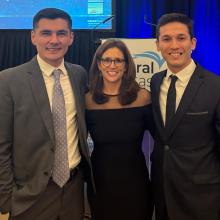Being the Change: Former International Students Solve the Struggles They Faced
In the United States, the rise in international enrollment during recent decades has been accompanied by growth in private sector companies that seek to address the hurdles faced by international students as they navigate living, studying, and working in a foreign country. While these companies are not new, many recent enterprises have been founded by former international students, who draw upon their lived experiences to shape their offerings and services. Overall, 25 percent of billion-dollar start-up companies in the United States were founded by former international students, and the higher education space is beginning to see the impact of these entrepreneurs.
The work of campuses and international education nonprofits remains crucial in supporting international students, but international-alumni-turned-entrepreneurs are now a key component of the wider ecosystem of innovative solutions for international students. The five entrepreneurs featured in this article started companies that cover the full spectrum of international student needs, from financing a global education (MPOWER Financing), to figuring out where to live upon arrival (4stay), to leveraging global networks and navigating the world of careers after graduation (Localized and Interstride).
Many of them have been recognized for their work. In 2024, Smadja received the EY (Ernst & Young) Entrepreneur of the Year Mid-Atlantic Award, and MPOWER Financing has been listed among the “World’s Top Fintech Companies,” recognized by Forbes and the Financial Times. Avni of Localized was named a “2018 Power Woman in Tech” by DCA Live and is a Young Global Leader with the World Economic Forum.
These new immigrant entrepreneurs have become essential partners in shaping the international education industry, working alongside institutions, nonprofits, and government agencies that serve international students in the United States. Some of them are also strong voices on the policy front, advocating for immigration reform that affects both international students and immigrant entrepreneurs. Their ventures not only create economic value but also foster cultural exchange, bridge gaps in various industries, and provide solutions to local and global challenges. Their stories are not just tales of business success but also of determination, creativity, and the power of leveraging a lived experience to drive solutions.
Emmanuel (Manu) Smadja
Country of origin: France
U.S. alma mater and degree: University of Virginia, master’s in systems engineering and bachelor’s in computer science and cognitive sciences
Current company/organization and job title: Cofounder and CEO, MPOWER Financing
What specific barrier is your company trying to overcome for international students, and how did your experience inspire this solution?
MPOWER Financing aims to remove financial barriers for international students by offering loans without requiring a cosigner or collateral. Our company empowers high-potential students from around the world to achieve their educational goals—[those] for whom a global education might otherwise be unattainable. By focusing on students’ future potential rather than collateral or a cosigner, MPOWER offers an innovative approach to student financing and enables students to be financially independent.
The idea for the company emerged from my personal experiences. Upon arriving in the United States, I struggled financially yet had few financing options despite coming from a country like France, which has a mature banking sector. My sister went through the same ordeal. Many years later, while pursuing a traditional career in finance, I encountered a Mexican student at my alma mater who was about to drop out of school because he couldn’t afford the $500 for his rent. This was a wake-up call for me to change course and use my financial and professional training to create a company that addressed financial challenges for international students.
When was your venture founded, and what is your reach across the U.S. higher education sector?
I cofounded MPOWER in 2014 with Mike Davis, who is also an immigrant entrepreneur, and we currently work with students from nearly 200 countries who attend the top 430 universities in North America. The firm has fulfilled the educational dreams of more than 15,000 students and plans to finance more than 10,000 students this academic year alone: [of our students,] 93 percent say that they would have not been able to study [internationally] without our financial support.
Why do you think we need an entrepreneurial approach to serving international students, alongside the work of universities and nonprofits?
When I founded MPOWER, I’d witnessed 15 years of status quo in international student financing from the time I was in college—traditional banks had done nothing for this segment. Traditional banks are not structured to work across borders, to leverage alternative data sources, and they’re burdened by legacy systems and bank branches. As a tech-savvy entrepreneur, I was able to design a solution from a clean slate. The loan application takes 15 minutes and is at your fingertips (from your smartphone), and we’re able to leverage alternative data so that we don’t have to rely on collateral and place a financial burden on the student’s family.
I’d witnessed 15 years of status quo in international student financing from the time I was in college—traditional banks had done nothing for this segment.
What do you think are enduring challenges that international students continue to face in the United States? What are some challenges that you have faced as an immigrant entrepreneur?
There continues to be a significant mismatch between the number of talented international students who want to remain in the United States and contribute to the U.S. economy and society and the number of visas available for them to do so. Expanding Optional Practical Training (OPT) is helpful but not nearly enough. We have a labor shortage of 10 million people in the United States, and talented immigrants can help fill this gap. International students and immigrants invest a lot in coming here. We have a duty in the United States to figure out how to [help them] do that smoothly and to give them that opportunity [to stay here].
What is your advice for international students who aspire to become entrepreneurs like you?
Entrepreneurship is a means to an end, not an end itself. Unless you’re passionate about an issue and that issue is best solved by creating a new entity, I don’t recommend starting a new entity. Instead, there are a lot of organizations doing great work at scale that would love to have your talent. Secondly, gaining experience first is important. I wouldn’t have been able to go very far with MPOWER if I hadn’t worked for companies like CapitalOne, McKinsey, Celanese, and Vistaprint first. Lastly, make sure you’re in it for the long run. The media sometimes make it seem like start-ups are overnight successes, but the reality is different. Being the CEO at MPOWER is the longest job I have ever held!
Faridun Nazarov and Akobir Azamovich
Country of origin: Tajikistan
U.S. alma mater and degree: Faridun Nazarov, Harvard University, master’s in management; Akobir Azamovich, Strayer University, bachelor’s in economics
Current company/organization and job title: 4stay
Faridun Nazarov, Cofounder and CEO
Akobir Azamovich, Cofounder and Chief Marketing Officer
What specific barrier is your company trying to alleviate for international students, and how did your experience inspire this solution?
Our company helps international students secure safe, ready-to-move-in accommodations before they even arrive in the country. Often, students face a stressful and time-consuming process of finding housing, dealing with contracts and rental agreements, and setting up utilities, all while navigating an unfamiliar environment. As former international students, we encountered these challenges firsthand, which inspired us to simplify the housing process for students. Our solution at 4stay removes these distractions so students can focus on their studies and extracurricular activities without worrying about housing logistics.
When was your venture founded, and what is your reach across the U.S. higher education sector? Do you have a sense of how many students you are impacting?
4stay has grown significantly since its founding in 2016, and today we partner with more than 400 institutions across 48 cities in North America. We’re proud to have served more than20,000 students to date.
Why do you think we need an entrepreneurial approach to serving international students, alongside the work of universities and nonprofits?
An entrepreneurial approach allows for rapid innovation and flexibility that can complement the more structured, sometimes slower efforts of universities and nonprofits. Entrepreneurs, especially former international students, bring a unique perspective. They understand the challenges firsthand and can identify gaps in existing services more quickly. This lived experience allows them to develop solutions that are more tailored, practical, and responsive to students' real needs. Moreover, the entrepreneurial mindset encourages experimentation, scaling of solutions, and rapid pivoting. By working alongside universities and nonprofits, these entrepreneurial efforts can drive systemic change, ensuring that international students are supported in a holistic, innovative way.
Our entrepreneurial journey is about making the process smoother for the next generation of international students.
What do you think are enduring challenges that international students continue to face in the United States? What are some challenges that you have faced as immigrant entrepreneurs?
Navigating the housing market remains a challenge. As immigrant entrepreneurs, we have also faced challenges that go beyond housing. Building a business in a new country means navigating unfamiliar legal, financial, and regulatory environments while also adapting to cultural differences. It requires a lot of resilience, adaptability, and the ability to quickly learn and apply new knowledge. But, at the same time, these challenges are opportunities to create solutions that address real problems, not only for international students but for immigrants in general. Our entrepreneurial journey is about making the process smoother for the next generation of international students.
What is your advice for international students who aspire to become entrepreneurs like you?
Embrace resilience and adaptability. The challenges that come with moving to a new country can also become your greatest sources of inspiration. As an international student, you already have the experience of navigating unfamiliar environments, which is a valuable entrepreneurial skill. Start by identifying problems you’ve faced and think about scalable solutions. Many successful ventures are born from solving a personal problem that others are also experiencing. Networking and building a support system are also key. Finally, persistence is everything. Entrepreneurship is not an easy path, and there will be setbacks.
Ronit Avni
Country of origin: Canada
U.S. alma mater and degree: Vassar College, bachelor’s in political science; Columbia Business School and Harvard Kennedy School, executive education programs
Current company/organization and job title: Founder and CEO, Localized
What specific barrier is your company trying to alleviate for international students?
Localized is a social enterprise that connects top university students and recent graduates in and from emerging markets with industry experts to guide them and global employers looking to hire them. Localized began by serving universities that did not have robust career-, alumni-, or employer-services infrastructure. Students were graduating without knowing what they could become or how to achieve their early career goals. We began by tapping into diaspora networks—top professionals at world-class companies who were motivated to support students from their countries of origin by providing career guidance and serving as role models. As we amassed quality partnerships with universities, employers began to sign up to look for talent. International students may or may not be able to stay in country after graduation, and they need a broader array of options [as well as help] navigating [immigration]complexities. Localized can help.
When was your venture founded, and what is your reach across the U.S. higher education sector? How many students does Localized serve?
We began in 2017–18 and now work with universities in Africa, the Middle East, South Asia, Europe (the United Kingdom and Turkey), and the United States for international students, and we’re expanding into Brazil and Pakistan. By offering tailored career support and mentorship, Localized helps students in regions with high youth unemployment rates to better navigate the job market to secure employment.
Why do you think we need an entrepreneurial approach to serving international students, alongside the work of universities and nonprofits?
International students face barriers—from accessing credit cards to securing employment—that are much more onerous than those facing domestic students, and developing new structures for supporting international students in these contexts is key. Also, there are common traits between international students and entrepreneurs: Both communities must demonstrate adaptability, flexibility, the ability to look at circumstances with fresh eyes, and sheer grit. It is no surprise that international entrepreneurs are building for international students—they remember the pain and understand how to alleviate it.
It is no surprise that international entrepreneurs are building for international students—they remember the pain and understand how to alleviate it.
What are some enduring challenges that international students continue to face in the United States?
The sheer insecurity of not knowing if you will be able to stay in a place over time is stressful. Ideally, we can offer international students a wider array of tools to deal with these challenges. These include knowing which countries issue visas easily, where students can live well and work, and if companies are open to using an employer of record (EOR) to pay international students abroad. If you graduate from a top U.S. university and end up working for your first-choice employer in Dubai, that’s a success story. By widening the lens and thinking globally, we give students more knowledge and tools.
What is your advice for international students who aspire to become entrepreneurs like you?
First, optimize for learning; really go for roles where you can learn the most the fastest and where you can see leadership in action. Taking risks early can yield incredible results later. The second piece of advice is to find alignment between your values and your aspirations, to find work that not only stimulates and motivates you but also ethically aligns with your whole self.
Nitin Agrawal
Country of origin: Nepal
U.S. alma mater and degree: University of Miami, bachelor’s in finance; University of California- Berkeley, master’s in business administration
Current company/organization and job title: Cofounder, Interstride
What specific barrier is your company trying to alleviate for international students, and how did your experience inspire this solution?
Interstride aims to alleviate the challenges that international students face in navigating their careers in the United States, which includes the lack of comprehensive resources and support. My own experience as an international student illuminated the significant gaps in understanding the complexities of visa processes, job search strategies, access to professional networks, and cultural integration. These challenges inspired the creation of a platform that not only offers resources but also provides a community and support system that empowers international students to achieve their goals.
When was your venture founded, and what is your reach across the U.S. higher education sector? How many students are you impacting?
Interstride was founded in 2018, and today we partner with more than 200 universities across the United States and are adding 50–70 new partners every year. This growth has enabled us to reach and support hundreds of thousands of international students through our platform, which has become a trusted resource for students.
Why do you think we need an entrepreneurial approach to serving international students, alongside the work of universities and nonprofits?
An entrepreneurial approach is essential because it allows for the agility and innovation needed to address the rapidly changing landscape of international education. Universities and nonprofits often operate within systems that are burdened by bureaucracy, which can slow down the implementation of new ideas and solutions. As former international students ourselves, we have firsthand knowledge of these challenges [students face] and address them swiftly through technology-driven solutions that can scale and adapt to meet the needs of students in real time.
My own experience as an international student illuminated the significant gaps in understanding the complexities of visa processes, job search strategies, access to professional networks, and cultural integration.
What do you think are enduring challenges that international students continue to face in the United States? What are some challenges that you have faced as an immigrant entrepreneur?
Navigating the complex visa and immigration system, building social capital, overcoming cultural and language barriers, and finding career opportunities that align with their skills and aspirations remain significant challenges. These issues are compounded by the uncertainty surrounding immigration policies, which can impact international students’ ability to remain in the United States after graduation. As an immigrant entrepreneur, I’ve struggled with securing funding, building a network in a new country, and overcoming biases in the business community. However, these difficulties have also fueled my passion for creating a platform that supports international students in overcoming similar obstacles.
What is your advice for international students who aspire to become entrepreneurs like you?
My advice is to embrace resilience and adaptability. The journey will be challenging, but your unique experiences as an international student provide you with a global perspective and problem-solving skills that are invaluable in the entrepreneurial world. It’s also crucial to understand the immigration implications of starting a business as a foreigner. Navigating visa requirements, securing work authorization, and ensuring compliance with U.S. immigration laws are all critical factors that can impact your ability to launch and sustain a business. •
Rajika Bhandari is principal of Rajika Bhandai Advisors, an international education research and strategy firm, and author of the award-winning book, America Calling: A Foreign Student in a Country of Possibility.
About International Educator
International Educator is NAFSA’s flagship publication and has been published continually since 1990. As a record of the association and the field of international education, IE includes articles on a variety of topics, trends, and issues facing NAFSA members and their work.
From in-depth features to interviews with thought leaders and columns tailored to NAFSA’s knowledge communities, IE provides must-read context and analysis to those working around the globe to advance international education and exchange.
About NAFSA
NAFSA: Association of International Educators is the world's largest nonprofit association dedicated to international education and exchange. NAFSA serves the needs of more than 10,000 members and international educators worldwide at more than 3,500 institutions, in over 150 countries.
NAFSA membership provides you with unmatched access to best-in-class programs, critical updates, and resources to professionalize your practice. Members gain unrivaled opportunities to partner with experienced international education leaders.


















